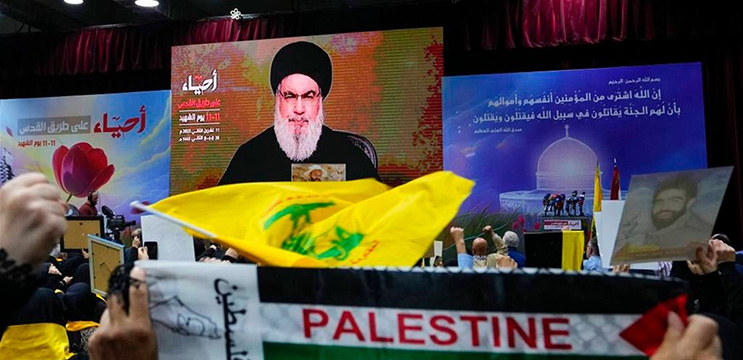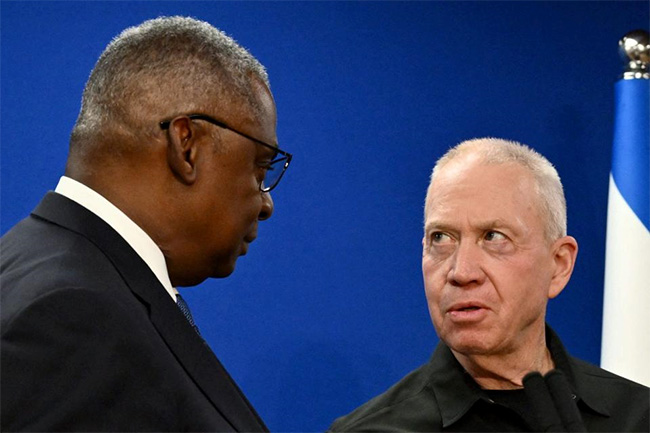 Photo: Al Manar
Photo: Al Manar
On September 27, 2024, the Israeli army announced it had bombed Hezbollah’s central headquarters in Beirut, targeting the group’s leader, Hassan Nasrallah.
The next day, Hezbollah confirmed in a statement Nasrallah’s death, vowing to continue its resistance against Israel and to support Gaza and Palestine.
Under Nasrall’s leadership, Hezbollah carried out significant military operations against Israel, culminating in Israel’s withdrawal from southern Lebanon in 2000 after a 22-year occupation, stresses ‘The Palestine Chronicle’.
He played a key role in the 2004 prisoner exchange with Israel, described as one of the largest swaps of prisoners and bodies, including prisoners from other Arab nations.
Palestinian Resistance factions mourned the leader of the Islamic Resistance in Lebanon – Hezbollah, Sayyed Hassan Nasrallah, as a martyr on the path to liberating al-Quds and the sacred Al-Aqsa Mosque in Palestine, writes ‘Al Mayadeen’.
The revolutionary leader, Sayyed Nasrallah, was martyred in a brutal air raid on the Southern Suburb of Beirut, launched by the Israeli regime on Friday.
Sayyed Nasrallah's role in supporting Palestine and leading Lebanon's confrontation with the expansive Israeli project was acknowledged by Palestinian Resistance factions, which underlined his steadfast decision to support Palestine and the Gaza Strip, despite the consequences of the stance.
The Islamic Resistance Movement – Hamas mourned Sayyed Nasrallah and his fellow comrades who were martyred in the Battle of Al-Aqsa Flood, saying that "they fought on the path to al-Quds and in support of the steadfast Palestinian people."
Hamas underlined that the Israeli regime committed a "cowardly terrorist act and a heinous massacre," when it carpet bombed the suburb of Lebanon's capital, Beirut.
"[The Israeli regime] remains a rogue entity, showing blatant disregard for all values, norms, and international conventions, threatening global peace and security amid international silence, impotence, and complicity," Hamas underlined.
Hamas stressed that the US administration also "bears responsibility" for the heinous crime, pointing out its "continued political, diplomatic, military, security, and intelligence support" for the Israeli regime.
Reflecting on decades of Resistance, the committees reiterated that assassinations by the Israeli enemy have never resolved battles or led to strategic victories. Instead, they inspire greater determination among fighters to continue the struggle. The martyrdom of Sayyed Nasrallah, they affirmed, solidifies the righteousness of the resistance’s path and the deep commitment to sacrifice.
The leadership of the Palestinian Liberation Organization (PLO) factions in Lebanon also mourned the martyrdom of Sayyed Nasrallah. The PLO factions strongly condemned the attack, accusing "Israel", which enjoys full US support, of trying to drag the region into a full-scale war to impose control over Arab nations and eliminate the Palestinian cause.
The PLO's executive body also mourned martyr Sayyed Nasrallah and the civilians killed in the Israeli aggression, urging an end to the Israeli wars of genocide on the Palestinian and Lebanese people.
The Palestinian Resistance factions also mourned Sayyed Nasrallah, saying that "his blood is now mixed with that of the Resistance martyrs in Palestine and across all fronts of battle and support on the path to al-Quds."
In a joint statement, the factions stressed that Sayyed Nasrallah was martyred in what they described as "the most honorable and pure battle of modern times – the Al-Aqsa Flood."
The statement affirmed that Sayyed Nasrallah led the Resistance against the occupation for decades, and in every stage, he stood with Palestine and al-Quds, noting that his legacy remains present in the fight against the Israeli occupation and the US administration for the sake of Palestine.
Jean-Luc Melenchon, a left-wing French politician, leader of the New Popular Front, which came first in the last elections, former Minister and former Member of the European Parliament, said the assassination “is one more step towards the invasion of Lebanon and general war”.
He said: “France no longer counts on the ground. Netanyahu’s crimes will continue since they are unpunished. The danger is extreme for the region and the world.”
 Lloyd Austin (left) with Yoav Gallant.
Lloyd Austin (left) with Yoav Gallant.
Photo: AP
US Secretary of Defense Lloyd Austin was furious with Defense Minister Yoav Gallant and Israel when he was informed with very little notice that the IDF was about to kill Hezbollah chief Hassan Nasrallah, reveals ‘The Jerusalem Post’.
Throughout the war, Gallant informed Austin before major developments has been a signature part of how the two governments have communicated, especially given the low level of trust between US President Joe Biden and Prime Minister Benjamin Netanyahu.
The two have developed close relations beyond the professional issues involved in coordinating the two countries' defense strategies, and yet Austin essentially lost it with Gallant over the Nasrallah killing and the short notice provided.
The most important factor for Austin and the Biden administration throughout the war regarding Hezbollah, has been to avoid falling into a larger regional war.
Multiple times, the US has urged Israel to act less aggressively or not to take certain actions against Hezbollah, to avoid such a scenario.
The implication is that in this case Gallant and Israel informed the US very late in the game so as to avoid a debate or situation where they could be pressured into not acting.
This decision, on top of the decision itself to kill Nasrallah, which Israel likely rightly predicted the US would have opposed, appears to have been an additional reason for Austin's personal anger at Gallant, despite his general trust in Gallant as one of the most apolitical and substantive members of the Netanyahu government, who has generally valued US advice more than many others.
read more in our Telegram-channel https://t.me/The_International_Affairs

 9:53 30.09.2024 •
9:53 30.09.2024 •






















